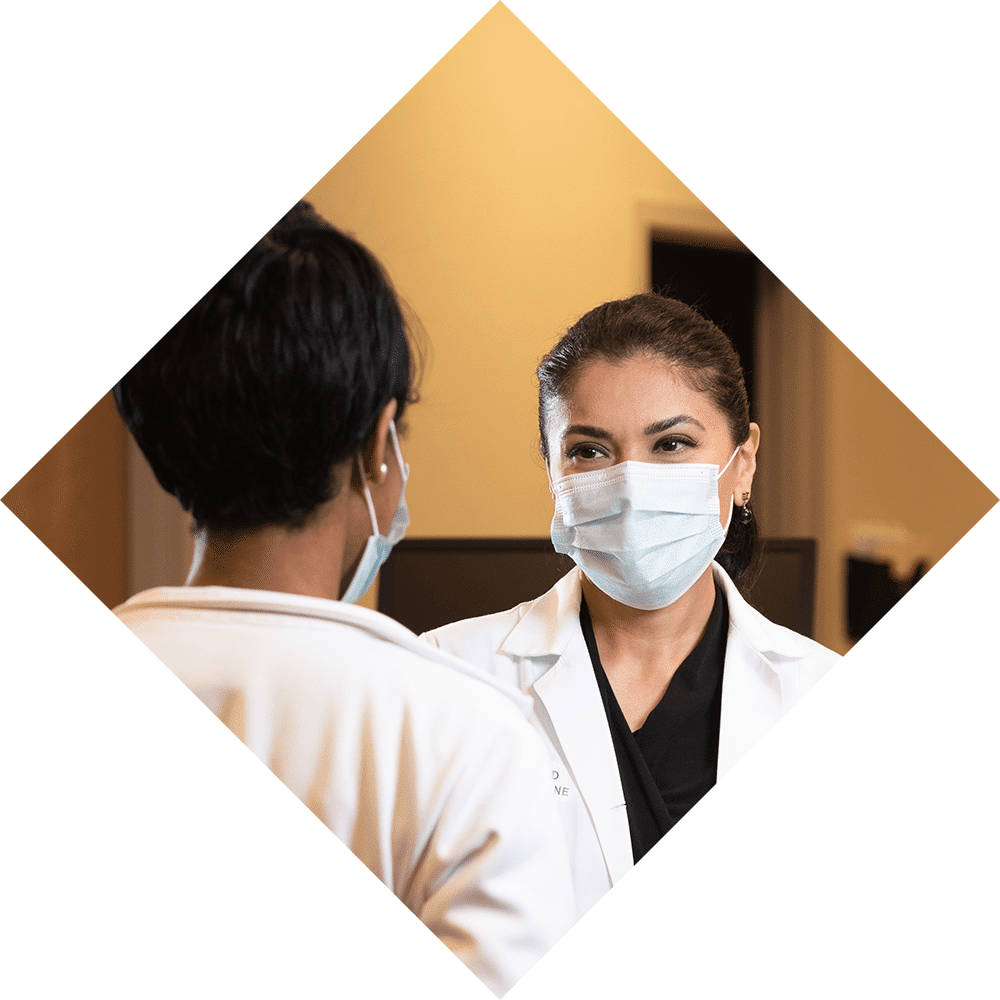A year ago, everything stopped. There was silence and even fear as we all retreated into our homes to face the uncertainties of COVID-19. Now a year later, many of the unknowns have diminished as we have all learned to live in new ways to keep each other safe.
And while shots of hope are making their way into arms across the nation, our medical staff agrees that now is the time to take control of your health. The vaccine is one important step toward regaining our safety and wellbeing, but so is your wellness care, annual screenings and management of chronic conditions.
So, if you are part of the 53% of patients who say they have postponed at least one medical appointment due to COVID-19(1), be assured that the time to hesitate about accessing care has passed.
How Longstreet Clinic is keeping you safe
We have learned a lot over the past year about COVID-19 and its transmission. According to the CDC, COVID-19 is spread mainly through close contact from person to person (within 6 feet) through exposure to respiratory droplets. While it is possible to spread the virus by touching surfaces that may have had respiratory droplets on them, this is not thought to be the common way COVID-19 spreads.
The best way to protect yourself from the virus is to wash your hands, wear a mask and watch your distance. And definitely get the vaccine if you can.
(Already received your COVID-19 vaccine? Share the good news with our “I got the shot” Facebook profile image. Simply click this link to review and add the frame to your profile picture.)
All of Longstreet Clinic’s locations are open and welcoming patients, as well as taking CDC-recommended precautionary measures to ensure the safest possible environment for care.
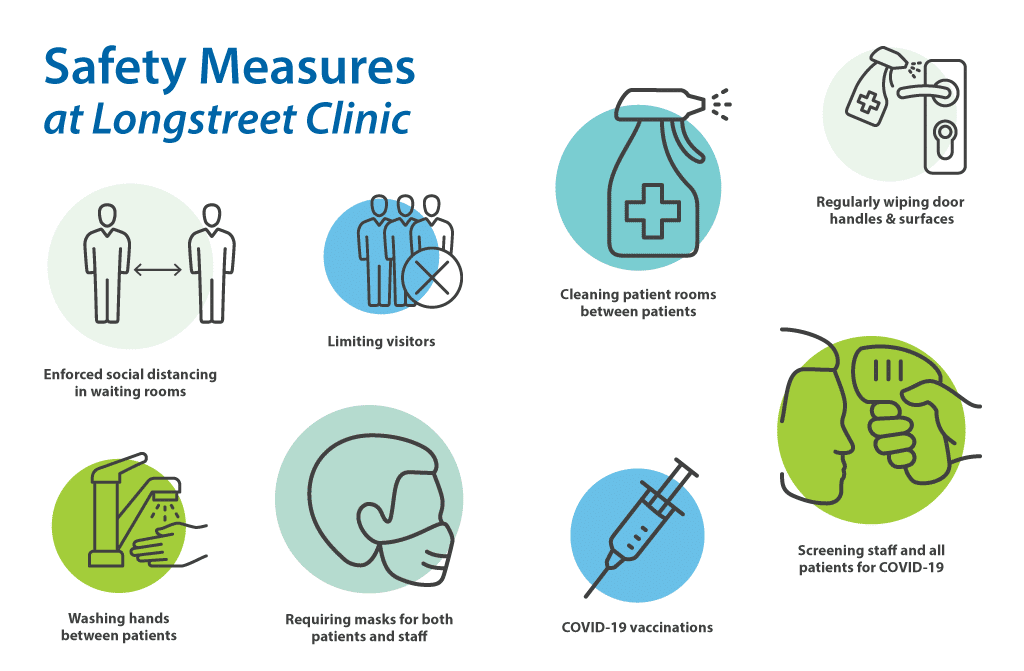
Safety Measures at Longstreet Clinic
- Enforced social distancing in waiting rooms
- Limiting visitors
- Requiring masks for both patients and staff
- Washing hands between patients
- Cleaning patient rooms between patients
- Regularly wiping door handles & surfaces
- Screening staff and all patients for COVID-19
- COVID-19 vaccinations
In addition, while Longstreet Clinic continues to treat some COVID-19 patients, most treatment and testing is done outside the walls of the clinic through our drive-up testing tent and telehealth visits.
Why Preventive Care is important
Ounce of prevention, pound of cure
“It is always easier to head off potential health issues before they’ve had a chance to take root in the body, so that is why we are so eager to have our patients maintain their regular preventive schedules,” said Danny Webb, FNP-C, DNP, with Longstreet Clinic Internal Medicine and Urgent Care in Gainesville. “My message to patients is simple: don’t allow the current pandemic to derail your active participation in your own healthcare.”
Key at all ages, preventive healthcare is especially important for children and seniors. Preventive services are tests or treatments that enable you to head off illnesses before they cause symptoms or problems. When disease is detected early, it can minimize the negative outcomes and often gives you more treatment options.
Preventive care also keeps you in the best shape possible. That means that you will be better equipped to handle any health concern that does arise – including global pandemics like COVID-19. For instance, a study found that 73% of patients hospitalized for COVID-19 symptoms had at least one underlying chronic condition (2).
Annual wellness or preventive exams often include two components – labs as well as the physical exam. At Longstreet Clinic, patients often have the option of getting lab work done up to a week before their scheduled physicals. This allows your provider to review your results with you at your appointment. While lab results may be available to you in MyChart ahead of the appointment with your provider, it’s important for you to keep the appointment for your exam.
“Regular check-ups are about more than a particular test result on a single day, like your cholesterol numbers,” Webb said, adding that healthcare providers look at a wide range of lab results patients are less familiar with and compare recent results to past values in order to identify any problems or trends. “The physical exam also gives us an opportunity to detect a wide variety of things patients may not notice, such as a suspicious mole or swollen lymph nodes.”
Chronic conditions that benefit from ongoing management/treatment
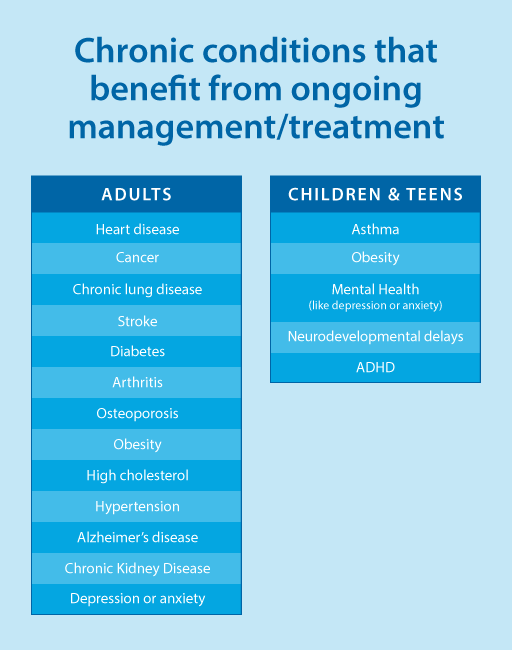 Adults
Adults
- Heart disease
- Cancer
- Chronic lung disease
- Stroke
- Diabetes
- Arthritis
- Osteoporosis
- Obesity
- High cholesterol
- Hypertension
- Alzheimer’s disease
- Chronic Kidney Disease
- Depression or anxiety
Children & Teens
- Asthma
- Obesity
- Mental Health (like depression or anxiety)
- Neurodevelopmental delays
- ADHD
“The American Academy of Pediatrics and CDC still recommend that children maintain their routine checkups, especially for those under the age of 2. This is for a number of reasons, including immunizations against diseases and in order to keep an eye on developmental growth and ensure there are no interruptions,” said Longstreet Clinic pediatrician Eugene Cindea, M.D.
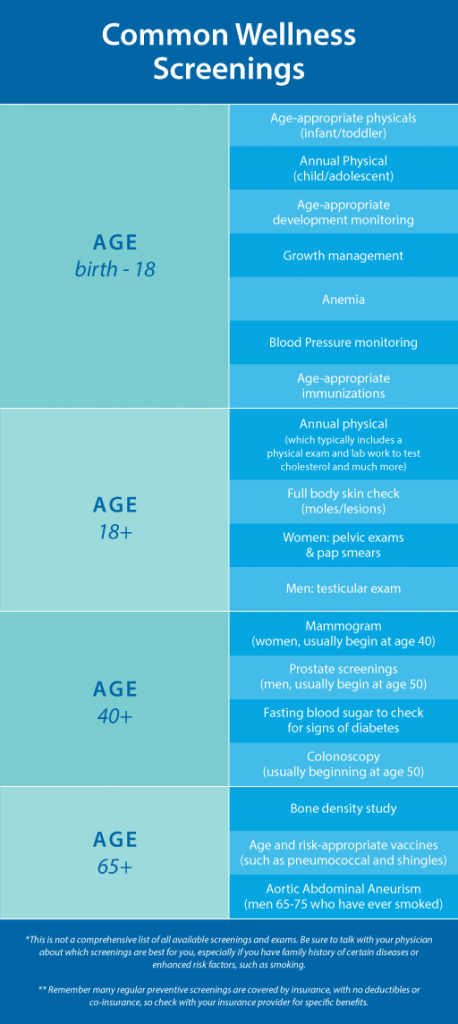 Common Wellness Screenings
Common Wellness Screenings
Age birth- 18
- Age-appropriate physicals (infant/toddler)
- Annual Physical (child/adolescent)
- Age-appropriate development monitoring
- Growth management
- Anemia
- Blood Pressure monitoring
- Age-appropriate immunizations
Age 18+
- Annual physical (which typically includes a physical exam and lab work to test cholesterol and much more)
- Full body skin check (moles/lesions)
- Women: pelvic exams & pap smears
- Men: testicular exam
Age 40+
- Mammogram (women, usually begin at age 40)
- Prostate screenings (men, usually begin at age 50)
- Fasting blood sugar to check for signs of diabetes
- Colonoscopy (usually beginning at age 50)
Age 65+
- Bone density study
- Age and risk-appropriate vaccines (such as pneumococcal and shingles)
- Aortic Abdominal Aneurism (men 65-75 who have ever smoked)
*This is not a comprehensive list of all available screenings and exams. Be sure to talk with your physician about which screenings are best for you, especially if you have family history of certain diseases or enhanced risk factors, such as smoking.
** Remember many regular preventive screenings are covered by insurance, with no deductibles or co-insurance, so check with your insurance provider for specific benefits.
Vaccines & Immunizations
COVID-19 has provided a reminder of how essential regular vaccines and immunizations can be to the health of individuals as well as our entire community – adults and children alike.
Immunizations play a critical role in pediatric preventive care by providing individual protection for children as well as overall herd immunity. They build a healthy base for the rest of their lives and avoid potentially debilitating illness. In addition, updated vaccinations are required for children to enter most schools and even colleges and universities.
Vaccines in adults like the flu shot, pneumonia shot, shingles, COVID-19, as well as boosters such as TDAP, are equally as important in protecting our loved ones and providing an extra layer of protection in keeping them healthy and safe.
Read more about vaccine facts and myths and Childhood Vaccine Schedules
Screenings Save Lives
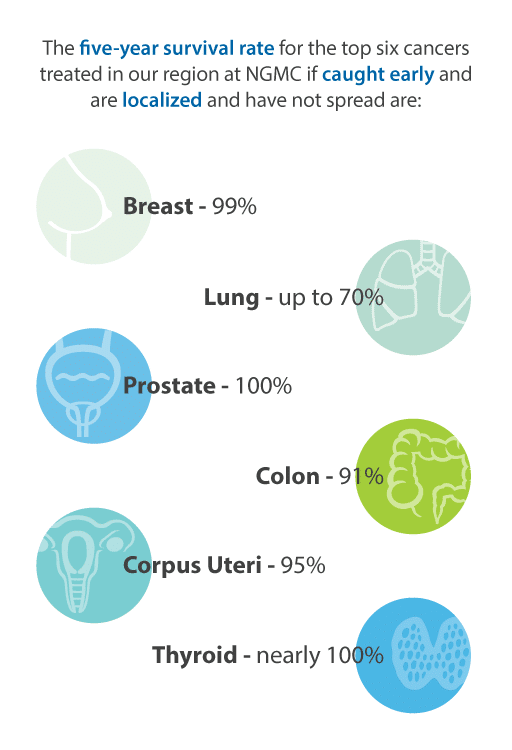 One estimate reveals that COVID-19-related delayed screening and treatment just of breast and colorectal cancers alone could result in almost 10,000 excess deaths in the United States (3). Data from Cancer Research UK suggests 80% of patients survive for at least 10 years after being diagnosed in early stages of eight of most common cancers.
One estimate reveals that COVID-19-related delayed screening and treatment just of breast and colorectal cancers alone could result in almost 10,000 excess deaths in the United States (3). Data from Cancer Research UK suggests 80% of patients survive for at least 10 years after being diagnosed in early stages of eight of most common cancers.
In fact, the five-year survival rate for the top six cancers treated in our region at NGMC if caught early and are localized and have not spread are:
- Breast- 99%
- Lung– up to 70%
- Prostate- 100%
- Colon– 91%
- Corpus Uteri– 95%
- Thyroid– nearly 100%
“The earlier we can find a potential growth or cancer, the better it is for the patient – both in terms of the outcome and the treatments available to them,” said Dr. Fernando Aycinena, a board-certified colorectal surgeon. “It’s important to get screened and catch it before it’s too late.”
So, what does this mean for you?
Medical experts agree that it means that there is no more time to delay your preventive care. If you have not seen a provider for a wellness exam or the ongoing management of a chronic condition since the COVID-19 pandemic began more than a year ago, it is safe to say that the time is now to call your provider so that they may recommend necessary screenings and exams to keep you healthy and strong. And remember, many regular preventive screenings are covered by insurance, with no deductibles or co-insurance, so check with your insurance provider for specific benefits.
Our specialized team is here, safely caring for you offering in-person and telehealth appointments when appropriate. The time is now. Take control of your health and be ready for whatever life may throw your way.
To find a provider click here or call 770-718-1122.
Citations
- xsperient-COVID-19 Returning to Normal in Healthcare (June 2020)
- Ko JY, Danielson ML, Town M, Derado G, Greenlund KJ, Daily Kirley P, et al. Risk factors for COVID-19-associated hospitalization: COVID-19-Associated Hospitalization Surveillance Network and Behavioral Risk Factor Surveillance System. Clin Infect Dis 2020;ciaa1419.
- Sharpless NE. COVID-19 and cancer. Science 2020;368(6497):1290.

